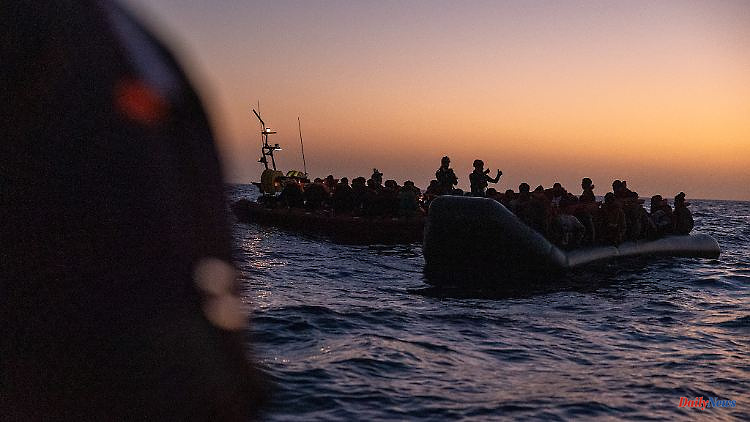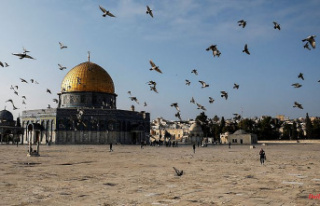The Italian government is no longer refusing to dock rescue ships with refugees on board. To do this, she forces the ships with the rescued people to head for ports in the north of the country that are far away from where they are deployed. "The goal behind this is to force the end of a mission and thus reduce the time the ships are in the theater of operations," says Sea-Eye's Gorden Isler. The club's ship, the "Sea-Eye 4", is currently being prepared for a new assignment in Spain.
ntv.de: At the end of December, the Italian government allowed the "Ocean Viking" to dock in Ravenna in northern Italy. The ship had 113 rescued refugees on board. Was that good news for sea rescuers in the Mediterranean?
Gorden Isler: It's a new tactic by the Italian government. The Italian authorities no longer wait for a rescue ship to contact them and ask for coordination, but instead approach the ships themselves as soon as they realize that a rescue ship has taken on refugees. That happened to us too, the "Sea-Eye 4" was sent to Livorno in December.
Livorno is on the height of Florence, so also quite far north.
Yes, surprisingly these ports are not the closest "safe places" in the sense of the international law of the sea, but are in the north of Italy, especially for civil rescue ships, although the ships of the Italian coast guard are allowed to dock further south. As a result, the arrivals and departures take much more time.
You imply intention?
The Italian government wants to issue a decree that requires rescue ships to head for the assigned port immediately after a rescue without helping other boats in distress. One can therefore probably not speak of an oversight here - the aim behind this is to force the end of a mission and thus shorten the time of the ships in the mission area. And this despite the fact that the Italian rescue coordination center has always maintained for the past three years that it is not responsible for coordinating sea emergencies in the Libyan search and rescue zone. Now she is suddenly doing exactly the opposite and taking over the coordination before we contact her and ask her to do so. It may be difficult to imagine in this country, but in Italy and Malta state actors have been behaving unpredictably for years.
Prime Minister Meloni is of the legal opinion that the refugees must be taken on board an NGO ship flying the German flag by Germany. What does that mean for your work?
That's what Matteo Salvini said when he was Italy's interior minister. There is no legal basis for this. Not even in Italy, by the way. It is therefore a purely political, right-wing populist narrative. A ship is subject to international law and the jurisdiction of its flag state, but that does not mean that you are on German soil when you board a German-flagged ship. According to the guidelines of the responsible UN authority, everything that goes beyond caring for the rescued should be avoided. You can't apply for asylum on a ship, for example, and the crew shouldn't even be allowed to determine the identity of the rescued. That is the sole task of an EU state and not that of a ship's crew.
The federal government says it is "our moral and legal obligation not to let people in distress drown" and has also offered to take in 3,500 asylum seekers who have come across the Mediterranean. Is that enough?
no But at least there is an improvement compared to the grand coalition. The old federal government always said that sea rescue was important, but did nothing concrete. With Federal Interior Minister Nancy Faeser, Germany has participated in the European takeover mechanism, even if it's only about 10,000 people in total - it's also clear that Rome can't be satisfied with that, because many more people are arriving in Italy. There has to be a lot more movement.
It is also noteworthy that the Bundestag decided in November to support sea rescue with 2 million euros per year. This is not only financially important for the sea rescue organization, it was also an important political signal.
Is your financing secured?
Far from it, we are still dependent on donations. The three major sea rescue organizations in Germany, Sea-Eye, Sea-Watch and SOS Humanity, which also maintain the four largest ships, together have an annual financial requirement of more than 12 million euros. So the 2 million isn't nearly enough, but it's a start. Much more important is the concrete, political approach. Because melodious words alone have not yet saved a single human life.
You complained about a drop in donations at the end of the year.
By the beginning of December 2022, we had around 23 percent fewer donations than in the previous year and there was no improvement. We also communicated this publicly at the end of December. Because the first mission of the new year was already in jeopardy. But the solidarity of the people and our partner organizations was so great afterwards that we can now actually carry out at least this first planned mission. The "Sea-Eye 4" is currently in the port of Burriana in Spain. We started the last mission from there because the local support for the sea rescue organizations in this port is simply outstanding. It is important that people stay alert and keep reminding themselves that sea rescue does not just happen. The sea rescue organizations are still dependent on the support of the people.
How many people did your Sea-Eye association save in the past year?
In 2022 there were more than 900 people. However, we were only able to carry out six out of seven planned missions because we lacked donations.
How many refugees and migrants drowned in the Mediterranean in 2022?
According to the International Organization for Migration (IOM), around 2,000 people drowned in the Mediterranean last year. But those are just the confirmed numbers. The number of unreported cases is likely to be much higher.
How many rescue ships are currently sailing in the Mediterranean?
Including the "Sea-Eye 4", six larger ships are currently operational. Another ship has been arrested in Italy and the "Sea-Watch 5" will hopefully be operational by spring. There are also five smaller ships and two search planes. All of this is supported by civil sea rescue organizations from different European countries.
The Italian government says the presence of sea rescuers on the Mediterranean would tempt more people to risk their lives making the crossing.
Saving lives as a "pull factor", this argument has existed since there has been civil sea rescue on the Mediterranean. There is no scientific evidence for this, on the contrary - it has been refuted several times. Researcher Matteo Villa of the Italian Institute for International Political Studies has consistently shown that there is no correlation between the number of people leaving the Libyan coast and the number of rescue ships in the Mediterranean. The number of departures and arrivals cannot be predicted - if so, then it follows the weather, although even when the weather is bad there are still people who apparently believe that they have a better chance because there are fewer Coast Guard boats around. The repetition of this narrative "pull factor" is therefore shabby and irresponsible.
100,000 people arrived in Italy last year. In 2021 there were only around 63,000. What do you think is the reason for the increase?
Despite Europe's increasingly brutal policies of deterrence and isolation, despite fences getting higher and more border guards being sent to the external borders, numbers have increased compared to 2021 along all escape routes - both via the western Balkans and the eastern Mediterranean, via the central route and via the western Mediterranean to Spain. That is why European politicians could gradually realize that the strategy of isolation and deterrence is not working. We must solve this challenge in a humanitarian way. The way we deal with people who have had to flee Ukraine shows that this is politically possible. If you want to distinguish between those seeking protection here, you should have to explain that.
Hubertus Volmer spoke to Gorden Isler












